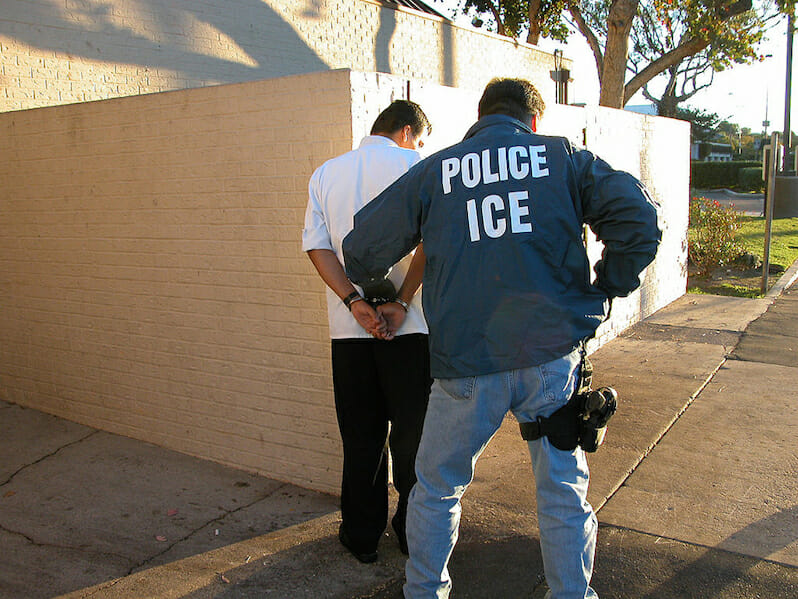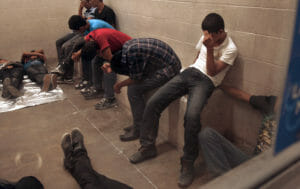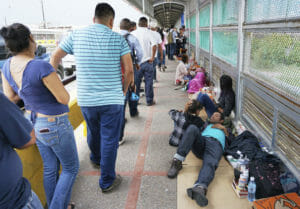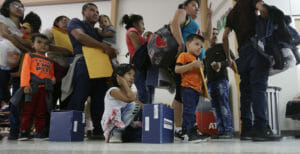A Veteran ICE Agent Speaks Out: ‘We Seem to Be Targeting the Most Vulnerable People’
The U.S. Immigration and Customs Enforcement (ICE) official, who chose to remain anonymous, adds that he sees more "contempt" in the agency's culture under the Trump administration. An ICE officer making an arrest in 2014. (Wikimedia Commons)
An ICE officer making an arrest in 2014. (Wikimedia Commons)
An ICE officer making an arrest in 2014. (Wikimedia Commons)
An interview with a veteran U.S. Immigration and Customs Enforcement (ICE) agent reveals the changing nature of immigration enforcement in America under President Trump.
“You have guys who are doing whatever they want in the field, going after whoever they want,” the agent, who spoke under anonymity, told The New Yorker’s Jonathan Blitzer. “The problem is that now there are lots of people who feel free to feel contempt.”
Blitzer explains that the longtime agent initially didn’t want any of their conversation to go public. But as the Trump administration cracked down on deportation, the agent grew increasingly disillusioned with ICE’s work. The final straw, Blitzer says, occurred last week when ICE decided to actively detain undocumented immigrants who came to the U.S. as minors and are just now turning 18. “Most of them are trying to lead new lives as American transplants, going to school and working,” Blitzer explains. “ICE now plans to pursue those who have turned eighteen since crossing the border, and who, as a result, qualify for detention as legal adults.”
The report, although brief, exposes how the culture within the agency has shifted drastically in the months since Trump took office. Blitzer writes:
“I don’t see the point in it,” the agent said. “The plan is to take them back into custody, and then figure it out. I don’t understand it. We’re doing it because we can, and it bothers the hell out of me.”
Like many ICE employees, the agent was a critic of President Barack Obama, whose push to standardize enforcement practice and micromanage agents, particularly during his second term, was a source of frustration at the agency. Yet with Obama gone, and the era of micromanagement over, the agent sees long-standing standards being discarded and basic protocols questioned. “I have officers who are more likely now to push back,” the agent said. “I’d never have someone say, ‘Why do I have to call an interpreter? Why don’t they speak English?’ Now I get it frequently. I get this from people who are younger. That’s one group. And I also get it from people who are ethnocentric: ‘Our way is the right way—I shouldn’t have to speak in your language. This is America.’ ” It all adds up, the agent said, “to contempt that I’ve never seen so rampant towards the aliens.” …
The agent went on, “The whole idea is targeting kids. I know that technically they meet the legal definition of being adults. Fine. But if they were my kids traveling in a foreign country, I wouldn’t be O.K. with this. We’re not doing what we tell people we do. If you look next month, or at the end of this month, at the people in custody, it’s people who’ve been here for years. They’re supposed to be in high school.”
Since Trump took office, there has been a rise in fear throughout undocumented communities as his administration rolls out harsh new immigration policies. And although members of his own party are working on legislation to help illegal immigrants gain U.S. citizenship, others on Capitol Hill have warned undocumented immigrants to “prepare for the worst.”
Trump, who promised during his campaign to rid the U.S. of “bad hombres,” is actually going after some of the most vulnerable communities: Under his administration, arrests of noncriminal illegal immigrants has risen 150 percent. Another new series by The New Yorker shares the stories of numerous mothers who have been deported under Trump, showing how these new immigration policies are directly responsible for tearing families apart.
Yet in the face of this crackdown, illegal immigration persists. Although the number of illegal border crossings from Mexico into the U.S. has dropped in 2017, officials worry that migrants are engaging in riskier methods to enter the U.S. Take, for example, a tragic case that occurred this past weekend. Dozens of people, crammed into a suffocatingly hot 18-wheeler truck as part of a human trafficking operation, were discovered in a Wal-Mart parking lot in San Antonio, Texas. Ten died and numerous others are still being treated.
“The numbers have gone down,” Luis Salinas, a sociologist with the Center for Immigration Research at the University of Houston, acknowledged on a recent radio interview. But he explains that many immigrants who are “economically desperate” are turning to more dangerous solutions.
“Now, we’re moving to these trailer rigs that are carrying large numbers of people,” Salinas says, referring to the San Antonio deaths. “Basically it’s like one trip, and [they’ll] try to maximize it as much as [they] can.”
Unfortunately, these harsh immigration policies are unlikely to change anytime soon, even though opposition to the new wave of policies is “backlogging already jammed immigration courts.”
“We’re going to get sued,” the veteran ICE agent bluntly states in his interview. “We’re putting more people into that overburdened system just because we can. There’s just this school of thought that, well, we can do what we want. … We seem to be targeting the most vulnerable people, not the worst.”
Your support matters…Independent journalism is under threat and overshadowed by heavily funded mainstream media.
You can help level the playing field. Become a member.
Your tax-deductible contribution keeps us digging beneath the headlines to give you thought-provoking, investigative reporting and analysis that unearths what's really happening- without compromise.
Give today to support our courageous, independent journalists.




You need to be a supporter to comment.
There are currently no responses to this article.
Be the first to respond.